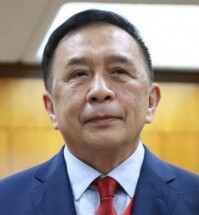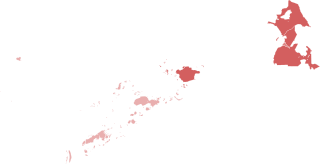
Mindanao is the second-largest island in the Philippines, after Luzon, and seventh-most populous island in the world. Located in the southern region of the archipelago, the island is part of an island group of the same name that also includes its adjacent islands, notably the Sulu Archipelago. According to the 2020 census, Mindanao has a population of 26,252,442 people, while the entire island group has an estimated population of 27,021,036 according to the 2021 census.

The Autonomous Region in Muslim Mindanao was an autonomous region of the Philippines, located in the Mindanao island group of the Philippines, that consisted of five predominantly Muslim provinces: Basilan, Lanao del Sur, Maguindanao, Sulu, and Tawi-Tawi. It was the only region that had its own government. The region's de facto seat of government was Cotabato City, although this self-governing city was outside its jurisdiction.

The Mindanao State University is a state university system in the city of Marawi, Philippines. It is the first state university in Mindanao, Philippines, established through Republic Act 1387. It is the second state-sponsored institution in the country, following the University of the Philippines.

Islam in the Philippines is the second largest religion in the country, and the faith was the first-recorded monotheistic religion in the Philippines. Historically, Islam reached the Philippine archipelago in the 14th century, through contact with Muslim Malay and Arab merchants along Southeast Asian trade networks, in addition to Yemeni missionaries from the tribe of Alawi of Yemen from the Persian Gulf, southern India, and their followers from several sultanates in the wider Malay Archipelago. The first missionaries then followed in the late 14th and early 15th centuries. They facilitated the formation of sultanates and conquests in mainland Mindanao and Sulu. Those who converted to Islam came to be known as the Moros, with Muslim conquest reaching as far as Tondo that was later supplanted by Bruneian Empire vassal-state of Maynila.

The Development Bank of the Philippines (DBP) is a state-owned development bank headquartered in Makati, Philippines.

Land Bank of the Philippines, is a government-owned bank in the Philippines with a special focus on serving the needs of farmers and fishermen. While it provides the services of a universal bank, it is officially classified as a "specialized government bank" with a universal banking license.

EastWest Bank, formally known as East West Banking Corporation, is the eleventh largest bank in the Philippines in terms of assets. It was founded in 1994 in Manila by the late tycoon, Andrew Gotianun and his wife. It is a member of the Filinvest Group, led by the Gotianun family. Its headquarter is at The Beaufort, a condominium building by Filinvest in Bonifacio Global City.
General elections were held for the first time on February 12, 1990, in the newly created Autonomous Region in Muslim Mindanao for the regional governor and vice governor.
1st Valley Bank is a development bank in the Philippines, based in Baroy, Lanao del Norte and servicing various areas in Mindanao, specifically the provinces of Lanao del Norte, Lanao del Sur, Misamis Occidental, Misamis Oriental, Bukidnon, Zamboanga del Norte, Zamboanga del Sur and Zamboanga Sibugay.

The Christian And Missionary Alliance Churches of the Philippines (CAMACOP) is a Christian evangelical group in the Philippines that originated from The Christian and Missionary Alliance (C&MA). It is one of the largest evangelical groups in the Philippines.

The following outline is provided as an overview of and topical guide to the Philippines:

The Spanish–Moro conflict was a series of battles in the Philippines lasting several centuries. It began during the Spanish Philippines and lasted until the Spanish–American War, when Spain finally began to subjugate the Moro people after centuries of attempts to do so. Spain ultimately conquered portions of the Mindanao and Jolo islands and turned the Sultanate of Sulu into a protectorate, establishing geographic dominance over the region until the Spanish-American War. Moro resistance continued.
In the Philippines, a government-owned and controlled corporation (GOCC), sometimes with an "and/or", is a state-owned enterprise that conducts both commercial and non-commercial activity. Examples of the latter would be the Government Service Insurance System (GSIS), a social security system for government employees. There are 219 GOCCs as of 2022. GOCCs both receive subsidies and pay dividends to the national government. A government-owned or controlled corporation is a stock or a non-stock corporation, whether performing governmental or proprietary functions, which is directly chartered by a special law or if organized under the general corporation law is owned or controlled by the government directly, or indirectly through a parent corporation or subsidiary corporation, to the extent of at least a majority of its outstanding capital stock or of its outstanding voting capital stock.

Bangsamoro, officially the Bangsamoro Autonomous Region in Muslim Mindanao is an autonomous region in the Philippines, located in the southwestern portion of the island of Mindanao.

Saidamen Balt Pangarungan is a Filipino businessman, lawyer and politician who previously served as the ad interim Chairman of the Commission on Elections from March–June 2022. He previously served as the secretary of the National Commission on Muslim Filipinos in the Duterte administration, and was the governor of Lanao del Sur from 1988 to 1992.

An autonomous region of the Philippines is a first-level administrative division that has the authority to control a region's culture and economy. The Constitution of the Philippines allows for two autonomous regions: in the Cordilleras and in Muslim Mindanao. Currently, Bangsamoro, which largely consists of the Muslim-majority areas of Mindanao, is the only autonomous region in the country.

The 1976 Tripoli Agreement was signed on December 23, 1976 in Tripoli, Libya by Carmelo Z. Barbero, representing the Government of the Philippines and Nur Misuari of the Moro National Liberation Front. The agreement defined autonomous administrative divisions for Muslims in the southern Philippines, the establishment of an autonomous government, judicial system for Sharia law and special security forces, and the observance of a ceasefire. The autonomous region was to have its own economic system, including an Islamic bank.

The COVID-19 pandemic in Bangsamoro is part of the worldwide pandemic of coronavirus disease 2019 caused by severe acute respiratory syndrome coronavirus 2. The virus reached the Bangsamoro Autonomous Region in Muslim Mindanao on March 11, 2020, when the first case of the disease was confirmed in Lanao del Sur. Cases has been confirmed in Lanao del Sur, Maguindanao, and the independent city of Cotabato.
The 1977 Southern Philippines autonomy plebiscite was a plebiscite to create an autonomous region held on April 17, 1977 in parts of Mindanao and Palawan in the Philippines.
















